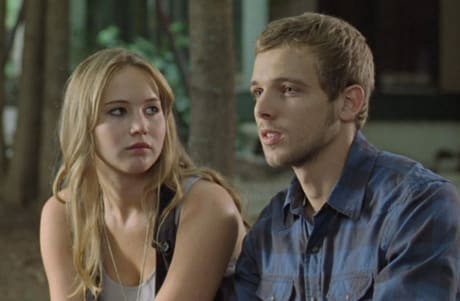Every year, like clockwork, a handful of unimaginative, interchangeable PG-13 studio horror films hit theatres just before Halloween, featuring whatever pop starlet is on the most magazine covers at the time.
Typically an inoffensive, but instantly forgettable remake, they're the stuff that DVD bargain bins are made of, making back their budget on opening weekend through sheer marketing overload and then disappearing into obscurity.
On merit, House at the End of the Street should technically transcend this cliché, by sheer virtue of featuring two Oscar-nominated actresses and not being a remake. And, to start, this nod to a small-town torches and pitchfork mentality has some potential to escape some of the cookie cutter trappings of the genre, focusing on the passive-aggressive relationship between ex-groupie single mother Sarah (Elisabeth Shue) and her musician with a saviour complex daughter, Elissa (Jennifer Lawrence).
Having moved from Chicago to the country, where their closest neighbour, college-age Ryan (Max Theriot), is the only surviving member of a family where a brain-damaged young girl murdered her parents, Sarah's dread of difference contradicts Elissa's curiosity about the ostracized boy. These constant contradictions between Elissa and Sarah are actually cleverly observed amidst the occasionally corny dialogue, but it's hard to take any of it seriously when both of them literally state their subtext and character archetype flat-out at least three times throughout the film.
Worse is that the central plot, wherein Ryan is balancing increasingly ludicrous at home secrets with his blooming romance with Elissa, is psychologically superficial and often laughable, which is exacerbated by Mark Tonderai's immature direction that routinely resorts to cheap camera tricks without reason. Presumably, the cheesy dialogue, unnecessarily convoluted plot and incoherent aesthetic are designed to mask the worst offense of this tepid teen horror, which is that of astoundingly antiquated morality bordering on a dark ages mentality.
After watching Jennifer Lawrence do what she can with a script that veers away from its strength ― the mother-daughter relationship ― far too often, we're left only with the observation that it's right to hate people that are different. We're also left with the brilliant Republican concept that children with absent or damaged parents are either psychopaths or are incapable of making good decisions.
So, parents, make sure to emulate the Cleavers and repress any sense of individuality you might have. And kids, make sure to harass and torment anyone different from the undiscerning, assimilative status quo.
(Alliance)Typically an inoffensive, but instantly forgettable remake, they're the stuff that DVD bargain bins are made of, making back their budget on opening weekend through sheer marketing overload and then disappearing into obscurity.
On merit, House at the End of the Street should technically transcend this cliché, by sheer virtue of featuring two Oscar-nominated actresses and not being a remake. And, to start, this nod to a small-town torches and pitchfork mentality has some potential to escape some of the cookie cutter trappings of the genre, focusing on the passive-aggressive relationship between ex-groupie single mother Sarah (Elisabeth Shue) and her musician with a saviour complex daughter, Elissa (Jennifer Lawrence).
Having moved from Chicago to the country, where their closest neighbour, college-age Ryan (Max Theriot), is the only surviving member of a family where a brain-damaged young girl murdered her parents, Sarah's dread of difference contradicts Elissa's curiosity about the ostracized boy. These constant contradictions between Elissa and Sarah are actually cleverly observed amidst the occasionally corny dialogue, but it's hard to take any of it seriously when both of them literally state their subtext and character archetype flat-out at least three times throughout the film.
Worse is that the central plot, wherein Ryan is balancing increasingly ludicrous at home secrets with his blooming romance with Elissa, is psychologically superficial and often laughable, which is exacerbated by Mark Tonderai's immature direction that routinely resorts to cheap camera tricks without reason. Presumably, the cheesy dialogue, unnecessarily convoluted plot and incoherent aesthetic are designed to mask the worst offense of this tepid teen horror, which is that of astoundingly antiquated morality bordering on a dark ages mentality.
After watching Jennifer Lawrence do what she can with a script that veers away from its strength ― the mother-daughter relationship ― far too often, we're left only with the observation that it's right to hate people that are different. We're also left with the brilliant Republican concept that children with absent or damaged parents are either psychopaths or are incapable of making good decisions.
So, parents, make sure to emulate the Cleavers and repress any sense of individuality you might have. And kids, make sure to harass and torment anyone different from the undiscerning, assimilative status quo.




